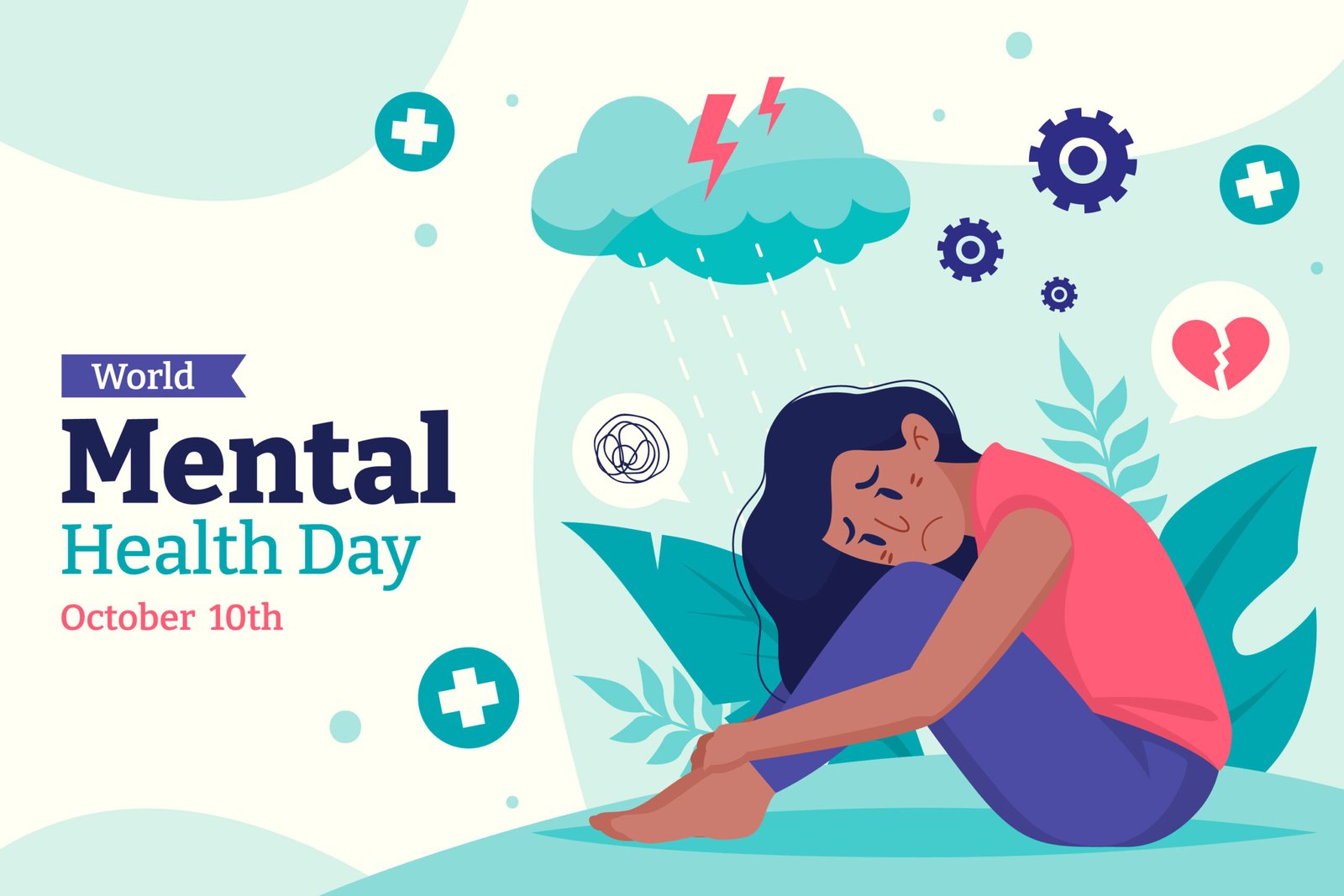Introduction
Mental health is an essential part of our overall well-being. It influences how we think, feel, and act in our daily lives. It also affects how we handle stress, relate to others, and make choices. Despite its importance, mental health is often overlooked or misunderstood. In recent years, however, there has been a growing awareness of how crucial mental well-being is for leading a balanced and fulfilling life.
What is Mental Health?
Mental health refers to the state of our emotional, psychological, and social well-being. It is not merely the absence of mental disorders but a state of balance in which a person can cope with the normal stresses of life, work productively, and contribute to their community.
Key Aspects of Mental Health:
- Emotional Well-being: Understanding and managing emotions effectively.
- Psychological Well-being: Having a sense of purpose and meaning in life.
- Social Well-being: Maintaining healthy relationships and connections with others.
- Cognitive Functioning: The ability to think clearly, make decisions, and learn new things.
Good mental health enables individuals to:
- Build and maintain healthy relationships.
- Adapt to change and cope with adversity.
- Be productive and contribute to society.
- Experience life’s pleasures and challenges with resilience.
Factors Affecting Mental Health
Mental health is influenced by a wide range of biological, psychological, and environmental factors.
1. Biological Factors
- Genetics: A family history of mental illness may increase the risk of certain conditions.
- Brain Chemistry: Imbalances in neurotransmitters such as serotonin and dopamine can lead to mood disorders.
- Hormonal Changes: Puberty, pregnancy, or menopause can influence emotional stability.
- Physical Health Conditions: Chronic diseases, injuries, or neurological disorders may impact mental health.
2. Psychological Factors
- Childhood Experiences: Trauma, abuse, or neglect can lead to long-term emotional scars.
- Personality Traits: Low self-esteem or perfectionism can increase vulnerability to stress.
- Cognitive Patterns: Negative thinking, pessimism, or unrealistic expectations can affect emotional balance.
3. Environmental and Social Factors
- Family and Relationships: Supportive family ties promote stability, while conflicts may cause stress.
- Socioeconomic Status: Poverty, unemployment, or financial strain can trigger anxiety and depression.
- Workplace Stress: Excessive workload, job insecurity, or lack of recognition can affect mental health.
- Social Media and Technology: Overuse or negative online interactions can contribute to isolation or comparison anxiety.
Common Mental Health Disorders
Mental health disorders vary in severity and impact. Understanding the most common ones can help identify symptoms early.
1. Depression
A mood disorder characterized by persistent sadness, loss of interest, and fatigue.
Symptoms include:
- Constant feelings of sadness or hopelessness.
- Lack of energy and motivation.
- Changes in appetite or sleep patterns.
- Difficulty concentrating.
- Suicidal thoughts or behaviors.
2. Anxiety Disorders
Involves excessive worry, fear, or nervousness that interferes with daily life.
Types of anxiety disorders include:
- Generalized Anxiety Disorder (GAD)
- Panic Disorder
- Social Anxiety Disorder
- Phobias
Symptoms:
- Restlessness or irritability.
- Rapid heartbeat or shortness of breath.
- Difficulty sleeping.
- Persistent worry or tension.
3. Bipolar Disorder
Characterized by alternating periods of depression and mania (extreme energy or euphoria).
Key symptoms:
- Extreme mood swings.
- Impulsiveness during manic episodes.
- Fatigue and withdrawal during depressive episodes.
4. Schizophrenia
A severe mental disorder affecting how a person thinks, feels, and behaves.
Symptoms:
- Hallucinations and delusions.
- Disorganized thinking or speech.
- Social withdrawal.
5. Post-Traumatic Stress Disorder (PTSD)
Develops after exposure to traumatic events such as accidents, violence, or natural disasters.
Symptoms:
- Flashbacks or nightmares.
- Emotional numbness.
- Avoidance of reminders of the trauma.
6. Eating Disorders
Include conditions like anorexia nervosa, bulimia nervosa, and binge-eating disorder.
Symptoms:
- Obsession with body weight and food.
- Extreme dieting or overeating.
- Distorted body image.
The Importance of Mental Health
Maintaining good mental health is vital for overall well-being. It contributes to a person’s ability to function effectively and maintain healthy relationships.
Benefits of Good Mental Health:
- Improved Physical Health: Mental well-being reduces the risk of chronic illnesses.
- Better Productivity: A clear mind enhances creativity, focus, and problem-solving.
- Stronger Relationships: Emotional balance helps in building empathy and trust.
- Increased Resilience: Mentally healthy individuals can bounce back from setbacks.
- Positive Life Satisfaction: Good mental health promotes happiness and contentment.
Warning Signs of Poor Mental Health
It is important to recognize early signs that mental health may be declining.
Common Warning Signs:
- Persistent sadness or mood changes.
- Withdrawal from social activities or friends.
- Significant changes in appetite or sleep.
- Difficulty concentrating or making decisions.
- Increased use of alcohol or drugs.
- Thoughts of self-harm or hopelessness.
If these symptoms persist, professional help should be sought immediately.
Ways to Improve and Maintain Mental Health
Mental health can be nurtured through conscious lifestyle choices and self-care strategies.
1. Practice Self-Care
- Get enough sleep (7–9 hours daily).
- Eat a balanced diet rich in nutrients.
- Engage in regular physical activity like walking, yoga, or cycling.
- Take time for relaxation and hobbies.
2. Build Strong Relationships
- Stay connected with friends and family.
- Communicate openly about feelings.
- Seek support during difficult times.
3. Manage Stress
- Practice mindfulness or meditation.
- Use deep breathing exercises.
- Prioritize tasks and take breaks when needed.
4. Seek Professional Help
- Consult a psychologist, psychiatrist, or counselor when needed.
- Consider therapy options such as Cognitive Behavioral Therapy (CBT) or talk therapy.
- Use prescribed medications responsibly.
5. Limit Negative Influences
- Reduce screen time and exposure to harmful content.
- Avoid substance abuse such as alcohol or drugs.
- Set healthy boundaries in personal and work life.
6. Promote Mental Health Awareness
- Encourage open discussions about mental well-being.
- Participate in community programs that promote mental health education.
- Support others struggling with mental illness without judgment.
The Role of Society in Mental Health
A healthy society plays a major role in supporting mental well-being.
Social Responsibilities Include:
- Creating awareness: Eliminating stigma surrounding mental illness.
- Providing access: Ensuring affordable and accessible mental health care.
- Promoting inclusion: Supporting people with mental disorders in workplaces and schools.
- Education: Incorporating mental health education into school curricula.
Conclusion
Mental health is just as important as physical health. It affects every part of our lives — from how we think and feel to how we act and relate to others. Maintaining mental well-being requires effort, awareness, and compassion — both for ourselves and others. Society must work collectively to eliminate stigma, provide support systems, and promote a culture of acceptance and understanding.








